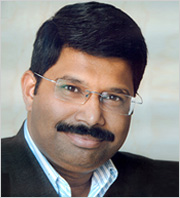
In this hard-hitting address, Dr Velamuri spoke on the urgent need for Indian B-schools to Internationalize. Dr Velamuri also wrote a column for MBAUniverse.com on this theme, below. The columns is a wake-up call for IIMs and other top tier B-schools, who are pioneers in India but are laggards compared to their Asian peers.
"Internationalizing Indian B-Schools"
By Dr Rama Velamuri, CEIBS, Shanghai
Several leading multinational companies, including Microsoft, Pepsi, Adobe, Deutsche Bank, Citibank, US Airways, and others have at some point in their history been led by CEOs of Indian origin. The vast majority of these CEOs studied in the Indian education system up to the bachelor’s level. Similarly, some of the most successful faculty members and administrators at global business schools are of Indian origin. It is therefore puzzling that there are so few Indian business schools in the global top 100.
The main reason for this is that Indian business schools have not seen the need until now to benchmark themselves with the leading global business schools. First, even the certificates that the best Indian institutions (the stand-alone business schools) offer, the Post Graduate Diploma in Management (PGDM) and the Fellow Program in Management (FPM), are not the same as the globally recognized degrees, the MBA and the PhD.
Second, Indian business schools hardly attract international students. I first studied and later taught at IESE Business School, which has 56 nationalities represented in the 2013 intake of approximately 280 MBA students. At the China Europe International Business School (CEIBS) where I now teach, 35% of our intake of 180 students is from outside mainland China, with the US, the EU, India, and South Korea making up the largest contingents. Other Chinese business schools, mainly at public universities, also attract decent numbers of foreign students.
Third, there are very few international faculty members employed by Indian business schools. At CEIBS, more than a third of our faculty is of non-Chinese ethnicity and more than two-thirds has non-PRC passports. Even public universities in China have been able to attract foreign faculty.
One reason India does not attract many foreign students and faculty is that its level of integration with global trade and investment flows is still quite low. China’s foreign trade (exports plus imports) is 5.3 times India’s, its inward stock of foreign direct investment (FDI) is 4.3 times and its outward stock of FDI is 4.5 times. This brings a much larger flow of international managers and international business opportunities to China. Thus, prospective MBA students and faculty see coming to China as a career enhancing move.
Fourth, very few Indian business schools run joint and dual degree programs with international institutions. Most leading Chinese business schools run such programs. This has given faculty members and staff from the Chinese schools exposure to best practices in program management and has been an important mechanism of knowledge transfer.
Finally, very few Indian business schools have sought to acquire international legitimacy by obtaining accreditation from the AACSB and the EFMD (which grants the EQUIS certificate). Nine Chinese universities have the AACSB and ten the EQUIS certification, whereas the number is two and two respectively for India.
In summary, although the MBA degree has only a twenty year history in their country, Chinese academic institutions have shown great determination and purpose in benchmarking themselves with global standards in order to upgrade the quality of their offerings. Indian business schools would do well to learn from them.
Dr Rama Velamuri teaches Entrepreneurship and Negotiation in the MBA, EMBA and executive development programs at the China Europe International Business School (CEIBS). He is the Academic Director of the CEIBS Center for Entrepreneurship and Investment, was the Academic Director of CEIBS’s Global Executive MBA from 2010 to 2012 and was the Academic Director of the Global CEO Program for Latin America, which is offered jointly with the Wharton School and IESE Business School, in 2009 and 2010. He was previously on the faculty of IESE Business School for four years (2003-2007), where he was the Academic Director of the Global Executive MBA and the Inside India programs.
Related Link
SPJain, NMIMS, Symbiosis, Jaipuria, TAPMI, IIM Shillong, MICA, FMS-BHU win IMC Awards 2014
IMC 2014: Vision 2025 offers answers to challenges facing Indian MBA
IMC'14 at IIC New Delhi to be held on Aug 8 & 9; 40 speakers from 10 countries to address
IIMA Director Dr Ashish Nanda to address Indian Management Conclave 2014
Stay tuned to MBAUniverse.com for more updates on Management Education trends.



























